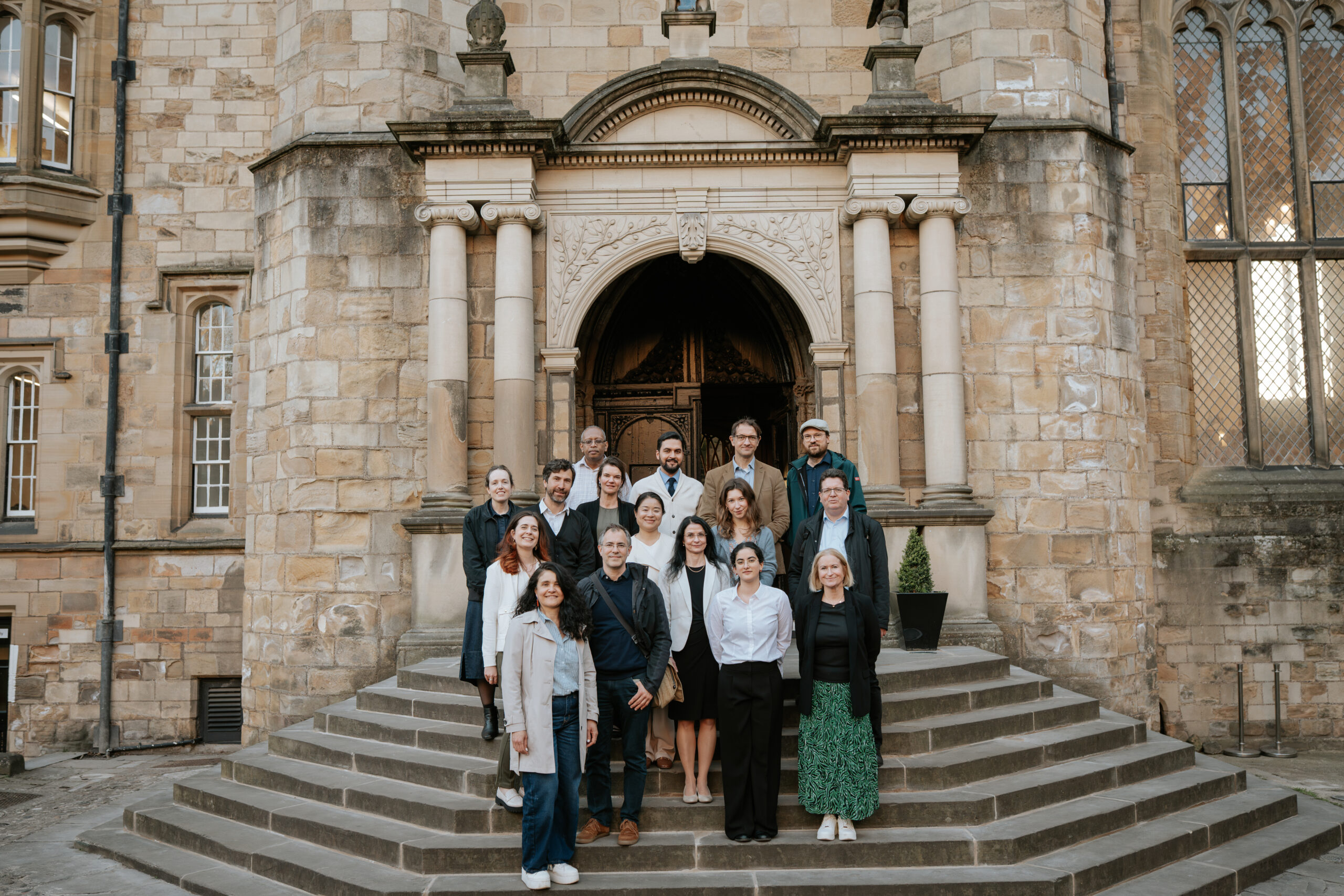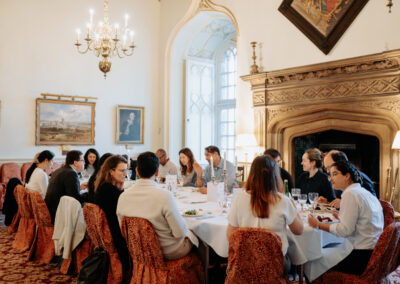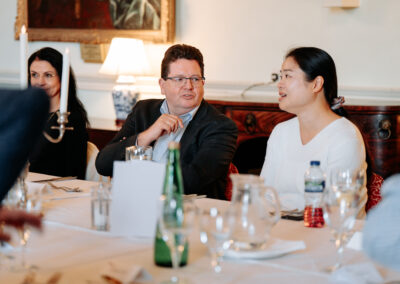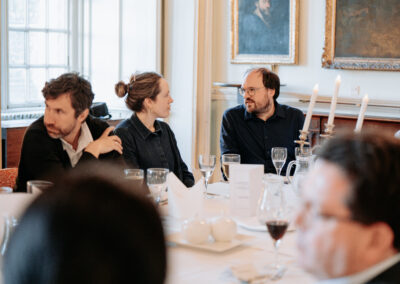Katrin Seidel

End of April 2025, the Just Transition Center (JTC) at Martin-Luther University Halle-Wittenberg joined forces with Durham University’s Centre for Sustainable Development Law and Policy (CSDLP) to hold an interdisciplinary workshop. The collaboration brought together scholars of legal studies, the social sciences, economics, environmental studies and computer science aiming at recalibrating research approaches and methodologies for just transition research.
The participants at the two-day workshop on 10-11 April 2025, from the JTC included Jonathan Everts, Steffi Formann (online), Chiara Gemoll, Shuai Han (online), Jürgen Höpfel (online) Alexander Klose (online), Stefan Knauß, Katrin Seidel, Timm Sureau, Christian Tietje and Amy Walker on-site. The CSDLP participants were Nelly Bencomo, Bilal Bilal, John Bothwell, Simona Capisiani, Giles Gasper, Mustafa Kamran, Laura Marsiliani (online), Petra Minnerop, Kate Morris, Katalin Sulyok (online) and Angelia Wang. Through 13 presentations from various disciplinary backgrounds, plenary discussions, and a collaborative mapping session, we explored diverse analytical tools to examine and understand the plural realities of transitions that are constantly being constructed, then negotiated, appropriated, or contested.
The workshop focussed on the interlinkages between legal studies, social sciences and data science methodologies, combining quantitative and qualitative methods, normative frameworks, and empirical insights to explore both the ‘what is’ and the ‘what ought to be’ of just transitions (JTs). During our interdisciplinary dialogue, we mapped potential and limitations of research methods, searching for ways to generate holistic, practical knowledge for just transitions.
The event aimed to address critical questions:
- How can we transcend disciplinary silos to capture the complexity of transitions?
- How can we balance technological innovation with ecosocical justice?
- What role do plurality, power dynamics, and epistemic diversity play in shaping “un/just” outcomes?
This blog entry discusses the outcomes, themes and implications of the workshop, offering reflections on how interdisciplinary collaboration can shape research on just transitions.
continue reading
A Shared Vision for Just Transitions
The collaboration between Martin Luther University and Durham University emerged from a shared understanding of the urgency of climate action and the imperative of just transitions of two teams: JTC’s innovation team Transregional Just Transition Governance: socio-legal and politico-economic perspectives examines how law, governance, and socio-economic equity intersect in the shift towards a ‘climate-neutral’ world. Meanwhile, CSDLP’s JusTNOW – Just Transitions to a Net Zero World investigates the pathways to decarbonisation through interdisciplinary legal and policy research.
Both teams agree: we are at a pivotal moment. The era of fossil fuels including lignite, coal, gas, fuel, diesel, and bunker oil is ending, or must gradually end, with industry clusters declining or transitioning, making way for new economic ecosystems. Yet entrenched legacy systems impede transformation in key sectors, while energy-intensive machine learning data centres pose new challenges around ownership and sustainability.
This shared perspective unites both initiatives under a core mission: to address the systemic governance challenges of phasing out fossil fuels while safeguarding ecosocial transitions. This is articulated through multilevel governance frameworks are designed to ensure that no one is left behind or pushed further behind in the global shifts towards low-carbon, environmentally sustainable economies and societies.
Cross-cutting themes for JT Research and Pathways
Plurality
The workshop’s participants emphasised that just transition research must embrace plurality while critically engaging with questions of democracy in the context of value pluralism.
As transitions are not a national but international endeavours, Katrin Seidel and Timm Sureau advocate for a transregional approach to capture the interconnected, multiscale nature of transitions within a globally plural legal landscape. It also stresses the ethical imperative of striving for actually just outcomes, focusing on how transitions are designed, implemented and experienced. Thus, legal frameworks and policies cannot be analysed in isolation; they must be situated within local political power dynamics, economic incentives, and community needs.
Understanding transitions as process-oriented, actor-centred phenomenon necessities qualitative, empirical methods – e.g. ethnography, case studies, and fieldwork – that reveal how diverse actors negotiate context-specific meanings for ‘justice’ and ‘transition’: This lens reveals JT’s promises and limits, fostering a processual understanding of law and governance. It bridges gaps between formal legal frameworks and the legal practice, ensuring transitions are evaluated with their political, economic, and social justice dimensions. By starting from legal pluralism as a fact, JT research moves beyond dichotomies – such as “top-down” vs. “bottom-up” – to address the interconnected, often uncanny realities of ecosocial change.
Interdisciplinarity
Embracing plurality means thinking beyond disciplinary silos. Just Transition research is inherently interdisciplinary, yet disciplinary silos often impede its full potential. Spanning economic, legal, political, social, geographical and environmental, and natural and material sciences, JT demands a departure from ‘traditional’ academic disciplines and policy frameworks that isolate knowledge within rigid boundaries. Our workshop underscored the limitations of such siloed thinking and methodologies, revealing how fragmented approaches risk exacerbating inequalities or overlooking systemic injustices. To address the multifaceted nature of just transition, research must integrate deductive, inductive, and mixed methods, bridging “law in the books” with “law in action.”
Tensions, Ethics and Reflexivity
Just transition research demands scholars to work with inherent conflicts between competing values – such as growth vs. sustainability or individual vs. collective rights. Central to this endeavour is the ethical imperative to avoid reinforcing existing power imbalances while maintaining self-awareness to avoid reinforcing existing power imbalances. As notions of “justice” permeate every stage of research – from design and participation to implementation – self-awareness, reflexivity and ethics are key for navigating these tensions responsibly.
For instance, Simona Capisiani’s philosophical exploration of the ‘right to liveable space’ have proposed an ethical framework for addressing climate im/mobility in a principled way, arguing that justice requires not only resource redistribution but also recognition of diverse worldviews. She emphasis procedural justice – ensuring, for example, inclusive decision-making – is as important as normative understandings of justice.
Similarly, Stefan Knauß advocates for balancing ecological and social justice through transformative learning, a concept integrating educational, environmental concerns, and social justice principles. By modifying Ethical Value Analysis for JT research through refocus on ‘principles’ rather than abstract ‘values’, he frames ‘sustainability’ as an inherent normative and conflictive principle encompassing ecologic, economic, social dimensions.
Inclusion, Participation and Equity in Just Transition Pathways
Inclusion was identified as prerequisites for democratising transformative potential of JTs. Sociocultural responsive methodologies – including gender-sensitive and Indigenous knowledge system – were highlighted by Wang as essential tools for centering marginalised voices in shaping transition pathways. Bilal Bilal’s quantitative analysis of CO₂ emissions, for example, highlighted the urgent need for climate policies that address the disproportionate impact of pollution on low-income communities, reinforcing the link between environmental harm and systemic inequality.
Discussions are also centered on the socio-political-tech dimensions of JT, emphasising class-based politics and the feasibility of intersectional inclusivity. For example, Amy Walker’s human-geographic ethnographic research on communities affected by just transitions revealed how top-down policies often fail to align with lived realities, exposing tensions between institutional agendas and lived experiences. Her work stresses the importance of participatory methods that amplify marginalised perspectives, ensuring transitions are not only ecologically sound but socially grounded.
Moreover, Angelia Wang further argued that JT agendas must expand beyond economic and environmental metrics to safeguard cultural heritage and intergenerational equity. She calls for a shift from “preservation” to “co-design” in just transitions”, integrating discourse analysis to create an “ecology of diverse knowledge systems” that includes gender-responsive and culturally sensitive approaches.
The role of digitalisation in transitions also came under scrutiny. Ghulam Mustafa Kamran called for a Human-Centered AI discipline, urging machine learning systems designed to “amplify and augment” human capabilities rather than displace them. He emphasises equity, privacy, and cognitive autonomy, and need-based design, while Nelly Bencomo explored the role of AI and digital twins in accelerating transitions and warned against exclusionary risks in AI driven transitions. She stressed the ethical imperative to co-design data inputs with local communities, ensuring that datasets reflect diverse knowledge systems. Bilal Bilal reiterated the need for international cooperation rooted in climate equity. His quantitative analysis of CO₂ emissions in high-emission countries revealed the urgency of aligning energy policies with social justice principles.
Looking Ahead: Building on Collaborative Momentum
The Durham workshop demonstrated the transformative potential of collaboration in addressing complex plural realities of Just Transitions. By centering interdisciplinarity, multiplicity and ethics, the event highlighted how actionable knowledge can merge when legal, social, and technological perspectives converge. Participants agreed: JT research must move beyond ‘technical’ fixes and market-driven logics, prioritising participatory governance and equitable power redistribution. Only by embedding inclusion – from data collection to policy design – can transitions address historical injustices and foster systemic change.
JT research must thus embrace uncertainty, fostering a culture that views plurality, tensions, conflicts and setbacks not merely as obstacles but as catalysts for conflict resolution and innovation. This approach requires interdisciplinary collaboration that challenge hegemonic narratives – such as the assumption that decarbonisation inherently equates to justice – and prioritises equity in both process and outcome. Only by dealing with ethical and methodological complexities can JT research illuminate pathways that reconcile systemic transformation with deeply rooted ecosocial concerns. Bridging legal, social, and technological perspectives and thereby recalibrating approaches and methodology to just transition research through interdisciplinary dialogue, and participatory research offers a blueprint for future collaborations. As we move forward, the cross-cutting themes, research questions and tools developed during the workshop will guide and deepen our joint efforts to reimagine ecosocial transitions.
Next Steps for collaboration:
Conducting the International Conference on ‘Just Transitions to a Net Zero World’ (9-10 October 2025) at Durham University to discuss key challenges:
(1) Interdisciplinary Research for Conceptualisations of Just Transitions,
(2) Digital and Technical Infrastructures for Just Transitions,
(3) Financing Just Transitions,
(4) Science for Just Transitions.
Creating integrative methodological toolkits: Building on the workshop’s focus on inductive, deductive, and participatory methods, we will develop toolkits tailored to JT research. These tools will be tested in case studies across sectors, such as the chemical industry (as explored by Alexander Klose and Jürgen Höpfel).
Expanding Interdisciplinary Networks: Establishing a European Union network for interdisciplinary knowledge sharing of JT, proposed by Steffi Formann to pool strategies and competencies across sectors, fostering collaboration between natural and social scientists.
By sustaining this momentum, our collaborative efforts will focus on expanding transnational research partnerships, analysing emerging governance structures, and developing strategies to integrate ecosocial considerations. The complexity of Just Transition challenges necessitates iterative, evidence-based approaches. The Durham workshop demonstrated that interdisciplinary collaboration and methodological rigor can enhance the robustness of research frameworks informing policy and practice.


